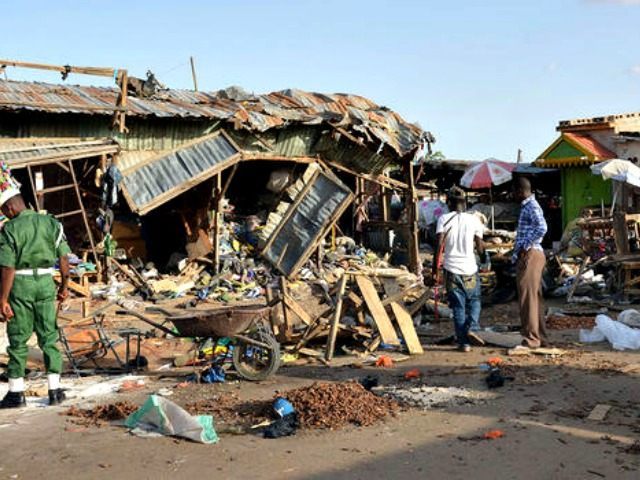Two teen girls interrupted afternoon prayers at a mosque in Maiduguri, northeastern Nigeria, with explosives, killing between ten and 30 people. The girls are believed to have been sent by Boko Haram, and one of the girls allegedly pulled away from the attack, ensuring that only she was killed.
The Associated Press reports that witnesses state at least 30 bodies were removed from the scene, with many others injured seriously by the blast. Witnesses state one girl blew herself up after positioning herself as close to the mosque as possible, which was especially full due to the Ramadan holy month, making it a more desirable target for Boko Haram. The second girl appeared to run away from the scene after the blast, and her bomb detonated far from anyone else, killing only herself.
Nigerian news sources note that, despite multiple witnesses placing the number of dead upwards of 30, Nigerian regional Police Commissioner Aderemi Opadokun told reporters that only 12 people were found dead following the blasts. Vanguard cites Opadokun, while noting that witnesses placed the death toll at closer to 35. Nigeria’s Premium Times places the number at 30, citing “hospital sources.” Vanguard adds that the mosque is “a stone throw [sic]” away from the new Nigerian Military Command and Control Center, which President Muhammadu Buhari ordered relocated out of the capital, Abuja, and into Maiduguri last month.
While Boko Haram has not yet taken credit for the attack, it is the fourth of its kind in Maiduguri this year, all previous attacks attributable to the Islamic State-affiliated terrorist group, which has since renamed itself the Islamic State West Africa Province. Boko Haram began using their hundreds of female captives as suicide bombers in June 2014, when a middle-aged Boko Haram captive attacked a military checkpoint. Since then, the use of female teen captives as suicide bombers has become commonplace in northeastern Borno, so much so that angry Nigerians have previously attacked women for merely suspecting them of being Boko Haram decoys. In March, 33-year-old Thabita Haruna was burnt to death by an angry mob after refusing to be screened by security at a market in northeastern Bauchi. Haruna had strapped water bottles to her waist and was acting erratically, triggering fears among the crowd. Her family explained after her death that her behavior was the product of mental illness.
Fear of female suicide bombers has spread beyond Nigeria as Boko Haram has widened the scope of its attacks, however, now targeting neighboring Chad and Niger for having joined a military coalition against the terrorist group. Suspected Boko Haram terrorists conducted the first mass bombing in Chad’s capital, N’Djamena, in that city’s history this month, prompting an immediate security reaction from the Chadian government, previously used to Boko Haram skirmishes on its border with Nigeria. The Chadian government banned the burqa— an Islamic full face and body covering– condemning it as potential camouflage for suicide bombers.

COMMENTS
Please let us know if you're having issues with commenting.